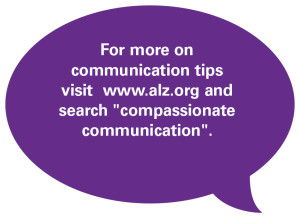 [6]We all have challenges from time to time coming up with the right word for something or trying to make ourselves understood. For our friends and family members with Alzheimer’s or a related disorder, this is a constant struggle.
[6]We all have challenges from time to time coming up with the right word for something or trying to make ourselves understood. For our friends and family members with Alzheimer’s or a related disorder, this is a constant struggle.
Coming up with the right word, sharing one’s thoughts and feelings and understanding what others are saying are all impacted by dementia to varying extents. Learning compassionate communication will significantly heighten quality of life for
everyone involved.
If I have Alzheimer’s you can help me best if you:
Don’t test my memory.
If I have Alzheimer’s or dementia, chances are I have some memory loss. Asking me whether I remember an event, person or experience can lead to embarrassment and frustration. Avoid quizzing your loved one with Alzheimer’s to see if they remember close friends and family members. Instead, provide proactive reminders of names and relationships, for example “Hi Mom, it’s your daughter Liz. I am here to take you to lunch today.”
Don’t argue, correct, contradict, confront, blame or insist.
This is probably one of the hardest tips to follow. Before Alzheimer’s comes along, we are able to challenge one another and point out “reality” in a reasonable way. We can explain our point of view, compromise and move forward. With dementia however, the affected person’s ability to reason is reduced. They are less likely to be convinced that their view of reality isn’t accurate. Often Alzheimer’s and dementia impacts one’s insight, making it impossible for the person to recognize their weaknesses and changes.
Focus on the present or the future.
As dementia progresses, remembering past events becomes increasingly difficult. Focusing on the present or future means that if I have dementia and I state I am hungry, don’t argue or tell me I ate an hour ago. Instead, say, “Wow, you are hungry today,” and offer a snack or set a time to eat soon.
Reduce anxiety.
Open-ended questions such as “Where shall we go?” “What do you want to eat/wear/do?” are surprisingly complex and create anxiety. Instead, give a choice between two items or direct their choice: “You look great in the red blouse. Would you like to wear that today?”
Remember that it can be unsettling to be confused.
Reassurance goes a long way. Continually offer support and comfort, letting the person you care for know that you are there to help.
Helpful information related to this story:




